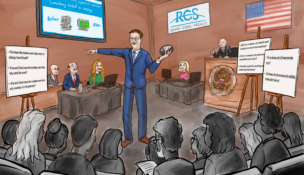Weborg v. Jenny, et al
By: dmc-admin//November 16, 2009//
MEDICAL MALPRACTICE: ZERO DOLLARS
Injuries claimed: Plaintiffs alleged that Dr. Borgnes should have added more information to his nuclear study report and that he misinterpreted an aspect of the test. Plaintiffs alleged Dr. Jenny should have sent Mr. Weborg to the cath lab based on the prior testing. Plaintiffs alleged Dr. Rebhan failed to send Mr. Weborg back to a cardiologist after continued complaints of chest pain.
Court: Door County Circuit Court
Case name: Weborg v. Jenny, et al
Case number: 07-CV-59
Judge: Judge Todd Ehlers
Verdict & settlement: Jury returned defense verdict
Highest offer: The parties stipulated to $1,000,000 in damages.
Award: Zero dollars (no negligence)
Disposition date: Oct. 16, 2009
Original filing date: March 6, 2007
Plaintiffs attorney (firm): J. Michael End, Hierseman & Crain, LLC, Milwaukee
Defendants attorney (firm): Mark Budzinski, Corneille Law Group LLC, Green Bay, for Dr. Rebhan; Bill Bauer, Coyne, Schultz, Becker & Bauer SC, Madison, for Dr. Borgnes, and Dave Colwin, Sager, Colwin, Samuelsen & Associates SC, Fond du Lac, for Dr. Jenny
Insurance carrier: PIC
Plaintiffs expert witnesses: Dr. Richard Lewan, family practitioner. Dr. Gary Dillehay, radiologist. Dr. Jeffrey Breall and Dr. Karyl VanBenthuysen, cardiologists.
Defendants expert witnesses: Dr. Alan David and Dr. Keith Ness, family practitioners. Dr. Marc Kaye, radiologist. Dr. Matthew Wolff, cardiologist.
Defense counsel’s summary of the facts: On March 24, 2004 William Weborg presented to his family physician, Dr. Rebhan, with complaints of chest pain while exercising. Dr. Rebhan performed a resting EKG, and then referred Weborg for an exercise stress test. Dr. Borgnes reviewed the nuclear portion of the EST, and found Weborg’s left ventricle to be mildly dilated, no reversible abnormalities, and a small fixed defect involving the anteroseptal region. The ejection fraction was 46 percent. The EKG portion of the stress test was markedly abnormal, with ST segment depressions showing ischemia.
After reviewing the results of the EST, Dr. Rebhan sent Mr. Weborg for a cardiology consult with Dr. Jenny. Dr. Jenny reviewed the EKGs and EST and took a history. Dr. Jenny determined the small fixed defect found in the nuclear study was likely artifact and there was no definitive evidence of ischemia. His impression was that Weborg’s complaints were most likely caused by musculoskeletal chest wall pain. Weborg was told to call back if his symptoms did not resolve.
On June 25, 2004 Weborg presented to Dr. Rebhan for a routine physical. Upon questioning, Weborg mentioned that he continued to have chest pain with exertion. Dr. Rebhan referred Weborg to physical therapy given Dr. Jenny’s report. Dr. Rebhan noted Mr. Weborg had been ‘ruled out from a cardiac standpoint.’
Weborg presented to physical therapy on Aug. 27, 2004. Weborg complained of burning chest pain that got better by drinking water. The burning in his upper chest spread into his arms. The pain was worse with bending forward, walking fast, or lifting heavy things. The pain would get better if he rested for about five minutes. The physical therapist found no tenderness to palpation and no signs of musculoskeletal impairment.
The physical therapist consulted Dr. Rebhan, and Dr. Rebhan prescribed a 10-day trial of Nexium for possible GERD.
Weborg called Dr. Rebhan on Sept. 10, 2004 to report the Nexium was not working but that he found relief with Tylenol. Dr. Rebhan scheduled an office visit with Weborg.
Before this office visit, Weborg died of a sudden cardiac arrest on Sept. 26, 2004. He was 42 years old. He left a widow and three grade school sons.
Legal News
- Some State Bar diversity participants walk away from program
- Wisconsin court issues arrest warrant ‘in error’ for Minocqua Brewing owner
- Iranian nationals charged cyber campaign targeting U.S. Companies
- Facing mostly white juries, are Milwaukee County defendants of color truly judged by their peers?
- Milwaukee Mayor speaks in D.C. Tuesday at White House water summit
- Chicago man sentenced to prison after being caught with ‘Trump Gun’
- FTC bans non-competes
- Gov. Evers seeks applicants for Dane County Circuit Court
- Milwaukee man charged in dismemberment death pleads not guilty
- Democratic-led states lead ban on the book ban
- UW Madison Professor: America’s child care crisis is holding back moms without college degrees
- History made in Trump New York trial opening statements
WLJ People
- Power 30 Personal Injury Attorneys – Russell Nicolet
- Power 30 Personal Injury Attorneys – Benjamin Nicolet
- Power 30 Personal Injury Attorneys – Dustin T. Woehl
- Power 30 Personal Injury Attorneys – Katherine Metzger
- Power 30 Personal Injury Attorneys – Joseph Ryan
- Power 30 Personal Injury Attorneys – James M. Ryan
- Power 30 Personal Injury Attorneys – Dana Wachs
- Power 30 Personal Injury Attorneys – Mark L. Thomsen
- Power 30 Personal Injury Attorneys – Matthew Lein
- Power 30 Personal Injury Attorneys – Jeffrey A. Pitman
- Power 30 Personal Injury Attorneys – William Pemberton
- Power 30 Personal Injury Attorneys – Howard S. Sicula








